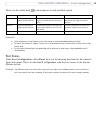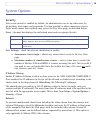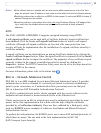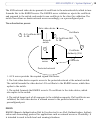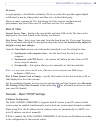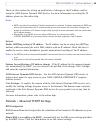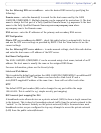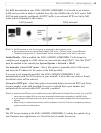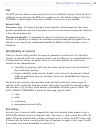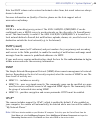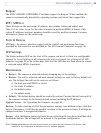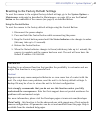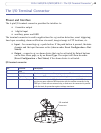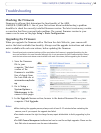
43
AXIS 216FD/FD-V - System Options
RTSP
The RTSP protocol allows a connecting client to start an MPEG-4 stream. Check the box to
enable the server and enter the RTSP port number to use. The default setting is 554. Note
that MPEG-4 video streams will not be available if this service is not enabled.
Network Traffic
Connection Type - The default setting is Auto-negotiate, which means that the correct
speed is automatically selected. If necessary, you can set the connection speed by selecting
it from the drop-down list.
Maximum bandwidth - To minimize the impact on other services running on your
network, it is possible to configure the maximum network bandwidth the product will be
allowed to use. Specify the maximum bandwidth (in Mbit/s or kbit/s) allowed, or set to
Unlimited.
QoS (Quality of service)
Quality of Service (QoS) provides the means to guarantee a certain level of a specified
resource to selected traffic on a network. Quality can be defined as e.g. a maintained level
of bandwidth, low latency, no packet losses, etc. The main benefits of a QoS-aware
network can be summarized as:
• The ability to prioritize traffic and thus allow critical flows to be served before
flows with lesser priority.
• Greater reliability in the network, thanks to the control of the amount of band-
width an application may use, and thus control over bandwidth races between
applications.
The QoS in Axis network video products marks the data packets for various types of
network traffic originating from the product. This makes it possible for network routers
and switches to e.g. reserve a fixed amount of bandwidth for these types of traffic. The
AXIS 216FD/FD-V/MFD/MFD-V marks the following types of traffic:
•video
•audio
•event/alarm
• management network traffic.
QoS Settings
For each type of network traffic supported by your Axis network video product, enter a
DSCP (Differentiated Services Codepoint) value. This value is used to mark the traffic’s IP
header. When the marked traffic reaches a network router or switch, the DSCP value in the
IP header tells the router or switch which type of treatment to apply to this type of traffic,
for example, how much bandwidth to reserve for it.



